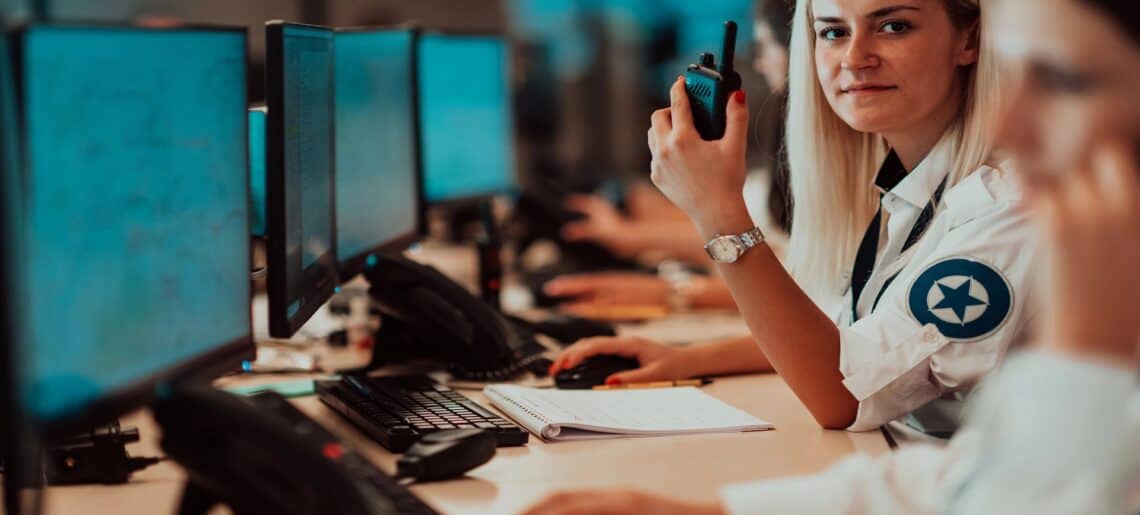Empathy: The Alberta Security Guard’s Secret Weapon

Last Updated on August 23, 2025
Security guards in Alberta are often the first line of defense in situations that involve conflict, aggression, or heightened emotions. Whether it’s a guard patrolling downtown Calgary office towers, responding to incidents in Edmonton’s West Edmonton Mall, assisting in hospital emergency rooms, or managing access at oil and gas sites in Fort McMurray, the role requires not only vigilance but also strong communication and conflict management skills.
At the heart of these skills lies something deeply human: empathy.
Empathy allows Alberta security professionals to understand and respond to the emotions, motivations, and perspectives of others. By incorporating empathy into daily interactions, guards can better manage conflicts, de-escalate tense situations, and ensure safer outcomes—all while complying with the standards set under Alberta’s Security Services and Investigators Act (SSIA).
What is Empathy?
Empathy is the ability to understand and share another person’s emotional experience. For security professionals, empathy goes beyond being polite—it’s about recognizing the deeper drivers of behaviour.
There are two key types of empathy:
- Affective Empathy: Actually feeling the emotions of another person. Example: A guard encounters a parent in Edmonton’s Kingsway Mall whose child has gone missing. If the guard is also a parent, they may directly feel the parent’s panic and urgency.
- Cognitive Empathy: Understanding another’s emotions and perspective without necessarily experiencing them. Example: A guard without children still recognizes the fear and stress in a parent’s voice when their child is missing and adjusts their approach accordingly.
Both affective and cognitive empathy are vital tools for Alberta security guards, as they help identify the root causes of conflict and reduce the need for confrontational behaviour.
Why Empathy Matters in Alberta Security
Alberta’s security environment is diverse. Guards work in shopping centres, corporate offices, public events, healthcare facilities, construction sites, and industrial zones. Across all these environments, empathy is a frontline skill that:
- Supports De-escalation: By acknowledging frustrations, fears, or confusion, guards reduce perceived threats and calm emotions.
- Builds Rapport: Empathy fosters trust, which makes cooperation more likely—critical when dealing with the public in cities like Calgary and Edmonton.
- Improves Communication: Guards who communicate with empathy reduce misunderstandings and prevent small issues from spiraling into larger incidents.
Alberta Scenario Example:
An already frustrated visitor at Foothills Medical Centre in Calgary becomes more agitated when surrounded by multiple guards. A lead guard notices the visitor’s discomfort, asks other officers to step back, and calmly reassures the person of their safety. The shift in tone and physical space often de-escalates the situation.
How Alberta Security Guards Can Cultivate Empathy
Empathy isn’t something you either have or don’t have—it can be developed. For Alberta security professionals, practicing empathy is just as important as physical presence or legal knowledge. Here’s how:
- Develop Active Listening Skills: Fully engage, acknowledge feelings, and restate to confirm understanding.
Example: A visitor at the University of Alberta campus complains about confusing signage. A guard acknowledges their frustration before helping them navigate. - Find Common Ground: Shared experiences reduce barriers.
Example: When a Calgary Flames game attendee complains about high parking fees, a guard mentions that even staff pay for parking, shifting the dynamic from adversarial to relatable. - Imagine Yourself in Their Situation: Consider how you would feel in the same circumstances.
- Use Cooperative Language: Phrases like “How can we resolve this together?” replace commands with collaboration.
- Self-Reflect: After encounters, review how empathy could have changed outcomes.
- Role-Play Scenarios: Many Alberta security training programs use scenario-based practice to strengthen communication.
- Practice Mindfulness: Stay aware of your own emotions so you can better read others.
Empathy in Real-Life Alberta Security
- Disoriented Visitor in Edmonton: A guard at Rogers Place notices a frustrated visitor looking lost. Instead of giving directions abruptly, the guard says, “Looks like you may be a little turned around—can I help you find your way?” The empathy diffuses frustration immediately.
- Aggression in a Calgary Hospital: A patient in an emergency waiting room yells about long wait times. Instead of demanding they calm down, a guard empathizes: “I know it’s frustrating—I’ve had to wait myself, and it’s tough. Let me check for an update for you.” Acknowledging the frustration builds trust and reduces aggression.
- Oil Sands Worksite Tensions: A worker denied access due to missing PPE reacts angrily. A security guard empathizes by recognizing the worker’s fatigue and frustration while firmly restating safety requirements. The empathetic approach avoids escalation while maintaining compliance.
Conclusion
For Alberta security guards, empathy is much more than a “soft skill.” It’s a core competency that strengthens conflict resolution, compliance, and professionalism in every sector—from Calgary corporate offices to Edmonton shopping centres to northern Alberta oil fields.
By applying empathetic strategies such as active listening, perspective-taking, cooperative language, and continuous self-reflection, guards can create safer environments while maintaining positive interactions with the public.
At Security Guard Course , we emphasize empathy and communication as key elements of our training programs. These skills not only keep guards safer but also improve professionalism across the province’s security industry.
👉 Looking to build your empathy and communication skills while meeting Alberta licensing requirements under the SSIA? Start your training today at SecurityGuardCourse.ca.

